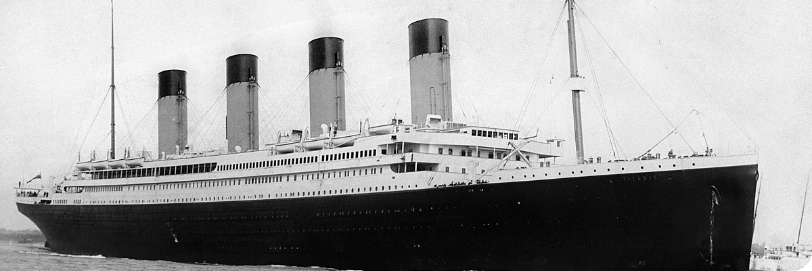The importance of information

Carlos Bedoya Castaño
Many people have told you that information is essential for the continuity of your business? Have you read in hundreds of articles how vital it is to protect and secure data?
Now is the time to measure its value and clearly understand how our environment is affected by tools to guarantee the computer security’s pillars: availability, integrity, and confidentiality.
We will highlight the importance of information in some historical events and validate what would have happened if they had platforms to digitize processes and manage the information in the Cloud.
The Titanic
There is still a lot of uncertainty around the sinking of the Titanic. Still, there is a theory that highlights the importance of access to data by the entire team. According to Senan Molony[1], an Irish journalist, the sinking of the Titanic occurred after a misinterpretation of the information.
In the middle of the 17th century, the development of the steamship began. Still, it was not until the end of the 18th century that the improvement of a steam engine was achieved, revolutionizing the marine industry. Before this, oceans were dominated by sailing ships, and there was a general rule, to turn to port (left), you had to orient the rudder to starboard (right) for the mechanism to work.
However, with the vast machinery and technology developed on the Titanic, this was no longer necessary. Port is port and starboard is starboard, something that was unknown to the liner team.
Robert Hitchins misinterpreted the first officer’s order William Murdoch. He, upon hearing “loud port,” turned directly to starboard, leaving the Titanic facing the iceberg, which at the time of the sighting was still two miles from the boat (1,9 miles). Of course, the crew detected the error and corrected the course quickly, but it was too late.
Nowadays, it is common to see the lack of interpretation of information at some organizations, especially when the work team must face the technologies’ challenges or new work methodologies.
Which shows us that:
- It is vital to have updated information for decision making.
- Access to it must be possible from anywhere in the world and at any time.
- The centralization of information improves the productivity of work teams.
[1] Senan Molony is an Irish journalist at the Irish Daily Mail. In 2008 published his first book in a series that thoroughly investigates all the secrets around the Titanic. His theory about the sinking of the ship is in Titanic Scandal: The Trial of the Mount Temple, 2011.
Pixar and Toy Story 2
For many, this is one of Disney’s most exciting animated movies. Still, very few know that with more than four months of work, Pixar lost 90% of the film due to a bug that removed the project from one of their servers.
Back then, all designers had access to the entire movie, and as a team, they built each scene simultaneously. However, in the fall of ’98, the characters disappeared from the screen, first in parts and then entirely.
One of the team members had run the command rm -rf used to remove files from the Linux and Unix directories (the operating system that Pixar worked on). Of course, the first reaction was to look for the backup, but upon reviewing it, they found that it only had a small fraction of the movie. Before starting production, the technical team had allocated 4GB of storage for the backup. After four months, the film was over 10GB in size.
Galyn Susman, who was working remotely for a few months after the birth of her son, was the one who had the solution to the problem. Pixar provided her a computer for the project and sent her updates weekly. It didn’t take long for the team to go home and sync up the pc back at the studio, thus preventing the designers from getting down to the task of redoing the entire movie.
These situations can become a nightmare for any company, especially when there is currently enough technology to:
- Make backups of all the information in the Cloud,
- Access information quickly and efficiently and
- Regardless of the age of the information, it is always available to company collaborators.
At InterNexa, we built a powerful platform to prevent the work carried out by your team, sinks into the waters of oblivion, and avoid your collaborators to face reprocesses, affecting productivity.
With Thunder, you will have a platform capable of interacting in any private, public, or hybrid environment with fast and flexible access to infrastructure resources.
Thunder includes integration with more than 15 public clouds and gives your organization’s information control, deployments, administration, processing technologies with high speed, preserving the pillars of computer security: Availability, Integrity, and Confidentiality.
Likewise, we have made a Template for managing information security , which you can use to help you avoid losing information that can be vital for the continuity of your business. Don’t forget that at InterNexa, you have the best allies.

Carlos Bedoya Castaño
Electronic Engineer, specializing in Project Management in Telecommunications Engineering, Master's Degree in Information Sciences and Communications. More than 15 years of work experience in national companies with a regional presence in the Telecommunications sector in the commercial areas, development of new products, commercial and business strategies.




.jpeg?width=352&name=Conexiones%20r%C3%A1pidas%20(1).jpeg)
.jpeg?width=352&name=Contenidos%20(1).jpeg)



.jpeg?width=352&name=FTTX%20(1).jpeg)

.jpeg?width=352&name=Velocidad%20de%20internet%20(1).jpeg)


